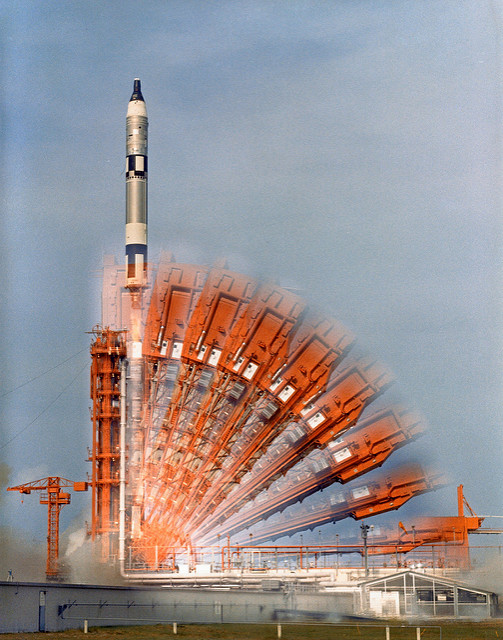News
ICBM rocket shopping: Elon Musk did it in Russia, so why not do it in the United States?
The ultimate goal of launching rockets is to get us exploring and building in space, not picking winners and losers. Simply put, if you can’t compete with the mousetraps on the market, you haven’t actually built a better mousetrap. Repurposed ICBM motors for rocket engines are not the problem.


Gemini 10 launches on a modified Titan ICBM motor. Credit: NASA on The Commons.
A Disagreement Among Star Travelers
There’s a debate going on among the government “powers that be” and commercial space companies over the use of excess intercontinental ballistic missile (ICBM) motors to launch rockets. Currently, these motors are banned from being used for commercial purposes, although military and civil launches are okay.
One side argues that the ban should be lifted because
- the missile parts provide a reliable, cost-effective means for space access; and
- it benefits taxpayers through recouped monies from private sales.
The other side wants the ban maintained because
- flooding the market with cheaper, “off-the-shelf” rocket parts could hinder the innovation and development of new rocket technologies by lowering demand for them; and
- larger companies will take away their market share through easy access to cheaper motors.
This same debate created the ban in the 1990s, and it should be mentioned that the main proponent of lifting the ban was a big part of passing it in the first place. It is also only fair to mention that this main proponent is a very large, established rocket company while the opponents are mostly smaller competitors.
Putting It All Into Perspective
First, it’s important to consider a reality-based context before taking a position on this. Absent another world war, globalization is here to stay, meaning that if a company in the United States cannot offer launch services at a  competitive price point, their potential customers will go elsewhere. Since these customers are not exclusively American companies, U.S. lawmakers cannot simply make the problem go away through legislation by restricting the nationality of launch providers.
competitive price point, their potential customers will go elsewhere. Since these customers are not exclusively American companies, U.S. lawmakers cannot simply make the problem go away through legislation by restricting the nationality of launch providers.
Second, it’s important to frame this issue using marketplace case studies relevant to the situation found here. Old technology is constantly giving way to updated and new technology, demonstrating that innovation is driven by a variety of factors, not just the pure need for a technology to exist.
Finally, it’s important to fully understand the motives of all parties involved. The commercial space industry is, by definition, business-oriented. At a fundamental level, all parties involved are concerned primarily with their own best interest, i.e., their ability to make a profit.
Space Access Should Be More Affordable
In my opinion, the ban should be lifted, as my position on issues like this will always tend towards expanding access rather than restricting it. Achieving democratized space travel will require affordable accessibility to space, and one of the best ways to drive costs down is to not spend valuable resources “reinventing the wheel” if existing resources work well for current needs. This isn’t to say that innovation isn’t necessary, but rather that different  missions have different needs, and the existence of one option doesn’t preclude the need for other options.
missions have different needs, and the existence of one option doesn’t preclude the need for other options.
The car industry is a good case study to compare to. The fact that older cars
exist does not prevent newer, generally improved cars from being developed and sold each year. Gasoline is a proven standard to fuel vehicles, but the demand for electric vehicles is getting louder. It’s the demand for better technology that moves this process of innovation forward.
The companies involved in this debate are profit-driven. What would motivate a company to keep inexpensive, proven technology out of a market they were competing in? In my opinion, the question itself contains the answer. Competition is a proven way to drive development, and the argument that a market flooded with competition would hurt competition has somewhat circular logic.
I do think it is fair to be concerned that the nature of competing against government for a product undermines the concept of a fair market; however, the global nature of launch services and the expanding need for more innovative solutions, i.e., more powerful rocket engines for the upcoming long-distance space missions, mitigate this concern.
 In the current environment, American launch providers are losing business to non-American launch providers, most of which are either heavily subsidized by their governments or are the governments themselves. In order for American launch providers to afford the costs of innovation and development, they need to be able to fairly compete in the global market for a customer base. It is also important to note that the rocket motor is only one part of the process of providing launch services. In that light, opening the ICBM market to American launch providers doesn’t make the American government the competitor as much as it is a retailer selling certain parts which make up a whole rocket product.
In the current environment, American launch providers are losing business to non-American launch providers, most of which are either heavily subsidized by their governments or are the governments themselves. In order for American launch providers to afford the costs of innovation and development, they need to be able to fairly compete in the global market for a customer base. It is also important to note that the rocket motor is only one part of the process of providing launch services. In that light, opening the ICBM market to American launch providers doesn’t make the American government the competitor as much as it is a retailer selling certain parts which make up a whole rocket product.
Elon Musk, Russians, and ICBM Engines (Oh, my!)
To frame this debate in another light, recall that Elon Musk’s initial space dreams involved purchasing ICBM motors from Russia to send dehydrated plant seeds to Mars. He wanted to accomplish something inspirational without diving head first into the business of building rockets. Fortunately for us, SpaceX was born through that process; however,  imagine a future, space-inspired millionaire looking to make a similar contribution except the purpose would ultimately be commercial. Why deny the option of a rocket built with “off-the-shelf” parts? There aren’t many Elon Musk types out there willing to invest most of their own personal fortune for a ten percent chance of success at building a rocket engine from scratch, but every time technology is sent into space, it moves us forward.
imagine a future, space-inspired millionaire looking to make a similar contribution except the purpose would ultimately be commercial. Why deny the option of a rocket built with “off-the-shelf” parts? There aren’t many Elon Musk types out there willing to invest most of their own personal fortune for a ten percent chance of success at building a rocket engine from scratch, but every time technology is sent into space, it moves us forward.
Elon Musk’s ICBM story isn’t the only thing worth noting in this debate. Unfortunately for supporters of the ban, SpaceX essentially renders their argument moot because SpaceX’s innovation and resulting lower launch price tag are what’s making Russian space authorities somewhat cranky about the business they’re usurping from them. Clearly, innovation is still possible even with other ICBM-based rockets on the market.
In Summary
The ultimate goal of launching rockets is to get us exploring and building in space, and this is hindered when the regulatory environment has the effect of hand picking winners and losers. Restricting ICBM motors from being on the commercial market does exactly that. This doesn’t advance the long term goals of space exploration. It only interferes with getting technology into orbit and beyond by restricting the capital available to develop better technology.
 The argument that innovation is hurt by a market full of ICBM motors is one based on a desire to control market forces in an unfair way. Simply put, if you can’t compete with the mousetraps on the market, you haven’t actually built a better mousetrap, and there’s nothing to prevent you from selling existing mousetraps in service packages while you develop better ones.
The argument that innovation is hurt by a market full of ICBM motors is one based on a desire to control market forces in an unfair way. Simply put, if you can’t compete with the mousetraps on the market, you haven’t actually built a better mousetrap, and there’s nothing to prevent you from selling existing mousetraps in service packages while you develop better ones.
Granted, as Elon Musk has reminded us in several interviews, rockets are hard, making the business of rockets even harder. Imagine, however, if the government banned access to all major highways, an existing tax-funded resource, because there was a need for a surface material that was resistant to pot holes and existing asphalt mixes hindered its development. It doesn’t take a rocket scientist to see what a bad idea that would be and what type of impact it would have on those needing the highways to conduct their business, especially while other countries still had their road systems up and running.
Autobahn, anyone?
News
Tesla cleared in Canada EV rebate investigation
Tesla has been cleared in an investigation into the company’s staggering number of EV rebate claims in Canada in January.

Canadian officials have cleared Tesla following an investigation into a large number of claims submitted to the country’s electric vehicle (EV) rebates earlier this year.
Transport Canada has ruled that there was no evidence of fraud after Tesla submitted 8,653 EV rebate claims for the country’s Incentives for Zero-Emission Vehicles (iZEV) program, as detailed in a report on Friday from The Globe and Mail. Despite the huge number of claims, Canadian authorities have found that the figure represented vehicles that had been delivered prior to the submission deadline for the program.
According to Transport Minister Chrystia Freeland, the claims “were determined to legitimately represent cars sold before January 12,” which was the final day for OEMs to submit these claims before the government suspended the program.
Upon initial reporting of the Tesla claims submitted in January, it was estimated that they were valued at around $43 million. In March, Freeland and Transport Canada opened the investigation into Tesla, noting that they would be freezing the rebate payments until the claims were found to be valid.
READ MORE ON ELECTRIC VEHICLES: EVs getting cleaner more quickly than expected in Europe: study
Huw Williams, Canadian Automobile Dealers Association Public Affairs Director, accepted the results of the investigation, while also questioning how Tesla knew to submit the claims that weekend, just before the program ran out.
“I think there’s a larger question as to how Tesla knew to run those through on that weekend,” Williams said. “It doesn’t appear to me that we have an investigation into any communication between Transport Canada and Tesla, between officials who may have shared information inappropriately.”
Tesla sales have been down in Canada for the first half of this year, amidst turmoil between the country and the Trump administration’s tariffs. Although Elon Musk has since stepped back from his role with the administration, a number of companies and officials in Canada were calling for a boycott of Tesla’s vehicles earlier this year, due in part to his association with Trump.
News
Tesla Semis to get 18 new Megachargers at this PepsiCo plant
PepsiCo is set to add more Tesla Semi Megachargers, this time at a facility in North Carolina.

Tesla partner PepsiCo is set to build new Semi charging stations at one of its manufacturing sites, as revealed in new permitting plans shared this week.
On Friday, Tesla charging station scout MarcoRP shared plans on X for 18 Semi Megacharging stalls at PepsiCo’s facility in Charlotte, North Carolina, coming as the latest update plans for the company’s increasingly electrified fleet. The stalls are set to be built side by side, along with three Tesla Megapack grid-scale battery systems.
The plans also note the faster charging speeds for the chargers, which can charge the Class 8 Semi at speeds of up to 1MW. Tesla says that the speed can charge the Semi back to roughly 70 percent in around 30 minutes.
You can see the site plans for the PepsiCo North Carolina Megacharger below.

Credit: PepsiCo (via MarcoRPi1 on X)

Credit: PepsiCo (via MarcoRPi1 on X)
READ MORE ON THE TESLA SEMI: Tesla to build Semi Megacharger station in Southern California
PepsiCo’s Tesla Semi fleet, other Megachargers, and initial tests and deliveries
PepsiCo was the first external customer to take delivery of Tesla’s Semis back in 2023, starting with just an initial order of 15. Since then, the company has continued to expand the fleet, recently taking delivery of an additional 50 units in California. The PepsiCo fleet was up to around 86 units as of last year, according to statements from Semi Senior Manager Dan Priestley.
Additionally, the company has similar Megachargers at its facilities in Modesto, Sacramento, and Fresno, California, and Tesla also submitted plans for approval to build 12 new Megacharging stalls in Los Angeles County.
Over the past couple of years, Tesla has also been delivering the electric Class 8 units to a number of other companies for pilot programs, and Priestley shared some results from PepsiCo’s initial Semi tests last year. Notably, the executive spoke with a handful of PepsiCo workers who said they really liked the Semi and wouldn’t plan on going back to diesel trucks.
The company is also nearing completion of a higher-volume Semi plant at its Gigafactory in Nevada, which is expected to eventually have an annual production capacity of 50,000 Semi units.
Tesla executive teases plan to further electrify supply chain
News
Tesla sales soar in Norway with new Model Y leading the charge
Tesla recorded a 54% year-over-year jump in new vehicle registrations in June.

Tesla is seeing strong momentum in Norway, with sales of the new Model Y helping the company maintain dominance in one of the world’s most electric vehicle-friendly markets.
Model Y upgrades and consumer preferences
According to the Norwegian Road Federation (OFV), Tesla recorded a 54% year-over-year jump in new vehicle registrations in June. The Model Y led the charge, posting a 115% increase compared to the same period last year. Tesla Norway’s growth was even more notable in May, with sales surging a whopping 213%, as noted in a CNBC report.
Christina Bu, secretary general of the Norwegian EV Association (NEVA), stated that Tesla’s strong market performance was partly due to the updated Model Y, which is really just a good car, period.
“I think it just has to do with the fact that they deliver a car which has quite a lot of value for money and is what Norwegians need. What Norwegians need, a large luggage space, all wheel drive, and a tow hitch, high ground clearance as well. In addition, quite good digital solutions which people have gotten used to, and also a charging network,” she said.
Tesla in Europe
Tesla’s success in Norway is supported by long-standing government incentives for EV adoption, including exemptions from VAT, road toll discounts, and access to bus lanes. Public and home charging infrastructure is also widely available, making the EV ownership experience in the country very convenient.
Tesla’s performance in Europe is still a mixed bag, with markets like Germany and France still seeing declines in recent months. In areas such as Norway, Spain, and Portugal, however, Tesla’s new car registrations are rising. Spain’s sales rose 61% and Portugal’s sales rose 7% last month. This suggests that regional demand may be stabilizing or rebounding in pockets of Europe.
-

 Elon Musk2 weeks ago
Elon Musk2 weeks agoTesla investors will be shocked by Jim Cramer’s latest assessment
-

 Elon Musk2 days ago
Elon Musk2 days agoxAI launches Grok 4 with new $300/month SuperGrok Heavy subscription
-

 Elon Musk4 days ago
Elon Musk4 days agoElon Musk confirms Grok 4 launch on July 9 with livestream event
-

 News1 week ago
News1 week agoTesla Model 3 ranks as the safest new car in Europe for 2025, per Euro NCAP tests
-

 Elon Musk2 weeks ago
Elon Musk2 weeks agoA Tesla just delivered itself to a customer autonomously, Elon Musk confirms
-

 Elon Musk1 week ago
Elon Musk1 week agoxAI’s Memphis data center receives air permit despite community criticism
-

 News2 weeks ago
News2 weeks agoXiaomi CEO congratulates Tesla on first FSD delivery: “We have to continue learning!”
-

 News2 weeks ago
News2 weeks agoTesla sees explosive sales growth in UK, Spain, and Netherlands in June



















